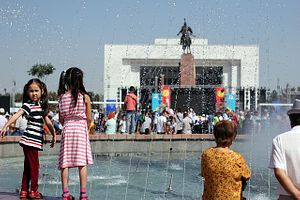Citizens of Kyrgyzstan will bundle up and head out into the cold this weekend to vote in the country’s seventh constitutional referendum. The last referendum took place in 2010 after the ouster of President Kurmanbek Bakiyev and installed the present constitution. This weekend’s referendum — a straight yes/no vote on more than a dozen changes — has been nothing if not controversial.
The changes see a shift in the balance of powers within the state toward the prime minister and away from the president. That’s a simple description of a complex set of changes.
Several regional analysts have parsed through the details, and I won’t regurgitate their breakdowns here in full. Bruce Pannier, of RFE/RL, compared the text of the existing constitution with the proposed changes; EurasiaNet also has a good rundown of the referendum; and Franco Galdini has a piece published by the European Council on Foreign Relations on the “constitutional gamble.” When the date of the referendum was set last month, I did a rundown as well.
The proposed constitutional changes are a grab-bag of needed updates, nationalistic additions, worrisome rebalances, and troubling removals.
For some, many of the changes are necessary but the timing inappropriate. Kyrgyzstan will hold a presidential election in October 2017 in which the current president, Almazbek Atambayev, is unable to run due to a single-term limit. This leads many analysts to suppose that the alterations to the constitution are designed to benefit Atambayev in his future political career. Insomuch as that may be true, the rumor itself is damning. If Atambayev finds himself in the prime minister’s seat after the 2017 elections, we can expect a bevy of Putin comparisons.
The biggest problem, however, is less the referendum itself and perhaps more the weakness the whole rigamarole has exposed in the Kyrgyz political system.
Unrelated to the constitutional referendum, but relevant when considering the strength and democratic maturity of the parliament, is the recent hubbub surrounding a quietly and unanimously passed bill that introduced registration requirements for foreigners traveling to Kyrgyzstan.
The law went into force with little thought to how it would impact the state’s reputation and tourism industry and with little apparent planning for implementation. Kloop found that some parliamentarians were unaware they’d voted for the law. One said the consequences were not explained.
In the December issue of The Diplomat Magazine I reviewed the registration law fiasco and asked, “If Kyrgyzstan’s lawmakers couldn’t be bothered to analyze one bill, why would they bother to analyze the myriad changes put forth in the referendum? And if the lawmakers couldn’t spare the time or energy to do so, why would the average Kyrgyz citizen?”
As Galdini points out, the draft law on the constitutional referendum was hurried through parliament in just over a month.
The constitutional changes have been the subject of grandstanding by political factions — leading to the breakup of the coalition government and reformation with referendum naysayers on the outside — and drove an additional wedge between Atambayev and his former partners in the 2010 revolution and subsequent interim government. The referendum’s alterations have been sharply criticized by international observers but not necessarily thoroughly debated among the Kyrgyz public or within the parliament.
Edil Baisalov, a former presidential advisor to interim President Roza Otunbayeva, told Galdini, “the general public seems largely unaware of what the amendments entail.”
Passage of the referendum requires a simple majority voting “yes” and at least 30 percent turnout.
Update: RFE/RL has posted a podcast, hosted by Muhammad Tahir, which brings together Bruce Pannier, Edil Baisalov, and Erica Murat to discuss the referendum. Worth a listen.
































